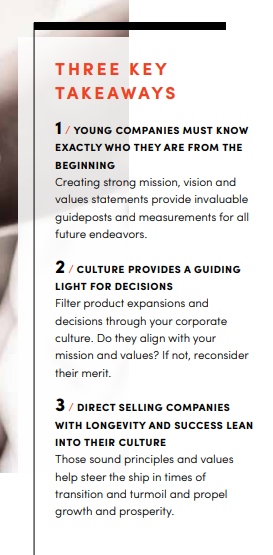Culture is a conversation for big companies, right?
I mean, how can you have a culture when you just got started?

Imagine two conversations. Both from people starting new companies.
In the first conversation, the new owner/leader was heard saying:
“After we launch, we will grow faster than any company in history. I expect us to be the next BILLION DOLLAR company.”
The second conversation went a bit differently.
“I know what our products have done for my family, and I want a lot more people to have that same experience. And I know we can extend that into helping communities where children are hungry.”
Both companies are the exact same age. Brand new companies. Great products. Similar compensation plan. Funded well.
Based on what you have read so far, is there any doubt that they have different cultures? Would you be attracted to one over the other?
The truth is, I’ve heard both of the previous statements uttered from new company leaders while doing the legwork to get up and running.
I’m sad to report that the next BILLION DOLLAR company didn’t make it past their first year.
The second company? Still around, nearly 15 years later.
But, you may ask, do those statements cause the death of the company or was the company just one of the normal percentage of casualties. Face it, most companies do not make it for a variety of reasons.
Of course, even the second, more altruistic group wants to make money. But money is a result of doing something bigger. Something more important.
Clearly, the second one had a vision to make an impact that went far beyond their own success. It’s a great example of why creating compelling Vision, Mission and Values statements are not just for established companies.
Knowing Who You Are
I believe that a strong set of statements provides the guideposts to help a young company become one of those “established” companies that we all look up to. They are the foundation to a culture that attracts and keeps people excited to do something special.

For example, Amway still abides by what they call their “Founders’ Fundamentals.”
FREEDOM, FAMILY, HOPE, REWARD.
Those four principles guided Amway through their early days and still guide them today. I suspect that, during the toughest times and the most critical moments where big decisions were made, they leaned on those principles to make the best decisions possible. Now, generations later, those words are still at the forefront of who they are.
There is amazing power in knowing what matters most and focusing on delivering on those elements.
Imagine the extraordinary challenges that Herbalife has faced over the last 40 years. And, they have come out of each major obstacle to become bigger and better than before. Yet, through it all, their core mission hasn’t changed. In short, their mission is “To change people’s lives through high-quality nutrition and a business opportunity.”
Why does all of this matter?
To some people, this all feels like fluffy words and phrases that make people feel better. Maybe it’s just an item on the launch list: “YES, we have vision, mission and values statements. Put it in the employee manual (when we have one), and let’s get to work.” Check!
Built to Last
The real question is whether you are using those words to build something special. Something that will stand the test of time. A company that people believe in and want to be a part of. A company we will write about 10-20+ years from now.
Do your products align with your purpose? For example, if your big mission in life is to provide a way for more people to live a healthy life, you wouldn’t be in the tobacco business—even if the profit potential was enormous.
Are you attracting and keeping people that love what you stand for?

Are your processes and systems designed to help you deliver on your promise?
I remember sitting in a room with a brand-new executive team and discussing their new company. Frankly, they had a terrible idea for a product/service to offer. They had a bad idea for how to market it. And although they came to us for help, we didn’t have a clue how to tell the story.
But, what they did have was a reason for existing that was HUGE and powerful. It meant something to these people. They wanted to make an impact that went far beyond the product or marketing idea.
As the meeting ended, we agreed they had challenges to overcome before we could help them. But, my colleague and I agreed that there was something about them that felt right. They were starting a business for a reason that most people don’t.
It was real.
It was honest.
Using their guiding principles, they went back to the drawing board and began to build a company with products that aligned with their mission. They changed their compensation idea and began to build a story that felt as honest as they were.
Bingo—they were on to something. They “got it” and were building something special.
Amazingly, here we are, nearly 15 years later, and the company is still around, doing what they promised. The same three core principles that forced them to reimagine the company before it began are still proudly posted on their website and discussed in every meeting they have with their field leaders. They also talk openly about them in meetings with their team at the home office.
They have an amazing, loyal staff that loves and supports the beliefs of the company.
They ARE their values.
They LIVE their founding principles.
Has it been easy? No way. But, when tough decisions were made, I know for a fact that they lean on their founding principles as guideposts.
The Right People, The Right Values
The principles that guide your company and leadership should either attract or discourage people to work with you. The old adage is to hire for culture/attitude and train for the job, and it actually works. I like to screen people to see if they are a “culture fit” above all. Of course, that person has to have a basic set of applicable skills and knowledge for the job. But someone who is overly trained and supremely qualified but DOES NOT FIT into your culture or doesn’t believe in your core principles may be the worst possible type of team member.

However, when you get it right and the person you hire “buys-in” to your principles and values, it is amazing. Those people stand out and help attract others who also “buy-in.” Momentum happens from the inside out. The field begins to see and understand who you are as a company. Those people who believe in you and your principles and values have a far greater chance of staying and succeeding with your company.
Like many of you, I could not work with people that don’t exhibit and live a set of principles that align with mine. And it doesn’t take long to know.
It’s the same when hiring someone to be on your staff. Be open about your guiding principles. Engage in discussions during the hiring process and try to ascertain their “fit” into the culture you are building. I have cut off an interview with a candidate within the first 5-10 minutes when it has become clear that we are not on the same page. I’ve apologized for seemingly wasting their time with an interview but also said that I didn’t want to waste any more of their time when it is already clear that this isn’t a good fit for them or the company.
The right fit is amazing. The wrong fit occupies way too much costly time and energy.
The culture of a company revolves around the core beliefs and principles that guide decisions throughout the organization.

Your Secret Weapon
If we look back at some of the most successful companies in our space, they have stayed true to their initial principles over their long history. What if Amway, Herbalife, Primerica or Mary Kay had changed their mind about who they are and what matters most to them? What would they be now? How big would they be? Would they still be around?
Fortunately for all of us in the channel, we will never have to answer those questions. They built their companies and made many leadership transitions and changes. And—through it all—stayed true to their vision, mission and values. They lead with sound principles and pass those on to new generations as they have grown.
More importantly, the values they represent and exhibit attract people who are attracted to them. It’s a powerful cycle and allows people to grow and even create a way for powerful succession planning.
Young companies are often strained to just get up and running and don’t often spend time defining these elements. “I will get to it later.”
After working with hundreds of companies, I’m convinced in the superpower that is a company’s values and core principles. It helps create a culture—from the beginning—that helps overcome obstacles and propels growth and success. It requires effort. It requires discipline. It requires hiring and firing to create a team with real alignment.
It’s hard. It takes soul-searching.
But, the effort is worth it.
Paul Adams has been involved in the direct selling channel for more than 30 years. Over the decades, he has worked with hundreds of companies and been a trusted advisor in boardrooms with countless executive teams. From corporate giants to pre-startup, Paul has helped companies invent, reinvent and solidify their messaging, strategy and execution.


